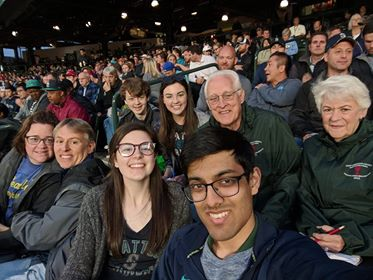By Emily Curtis, Applied Mathematics MS graduate
When I applied to the applied math MS program over a year ago, my plan was to become a data scientist. I’d seriously considered a career as an engineer, an actuary and in statistical analysis, but was drawn by the growing field of data science. I thought the Applied Math program would give me an opportunity to grow my skills and provide me with the qualifications I needed to start my career.
While this was absolutely true, that isn’t what ended up happening. I’ve always loved baseball and as a kid I dreamt of being a baseball statistician. Even through middle and high school, when people asked what I wanted to do when I grew up I’d say “realistically?” and if they said “No, what’s the dream?” I’d still say I wanted to work in baseball. Unfortunately, I wasn’t the only one with this dream. Jobs in baseball front offices have unbelievably many applicants with very few available positions. I knew it just wasn’t realistic to pursue this, so I started working toward Data Science.
The best thing about the applied math program was that it gave me the flexibility to leave both doors open. While I thought I’d for sure become a data scientist, after the career fair and a few interviews with companies, I realized my passion really was with baseball and it was worth it for me to pursue. I applied for an analytics internship with the Seattle Mariners and was fortunate enough to get the job. After accepting the job, I finished up my MS here at UW and continued taking classes that would end up helping me in my current position. I started my job with the Seattle Mariners on June 25th and have loved every minute of it. Going to work at Safeco Field every day is a dream. I get to collaborate with some of the smartest and most passionate people in the game.
As an intern, there are two primary parts of my job, a long-term project and frequent, short-term evaluations to do and questions to answer. The long-term projects could be anything from developing a model for pitcher’s effectiveness to determining an objective way to evaluate a player’s defensive skill. These projects really test our knowledge of modeling and data practices. In a lot of ways I’m using the skills I developed in my pursuit of data science. Cleaning and manipulating data is always an important first step in the process. The short-term projects often consist of providing my quick but data-driven opinion on a specific player. I spend a lot of my time reading about what’s going on in the sport and I love that my job gives me the opportunity to learn and grow.
I am so grateful for the applied math MS program which gave me the flexibility to pursue the career I always dreamed of and for providing me with the skills necessary to be successful once I got there.
